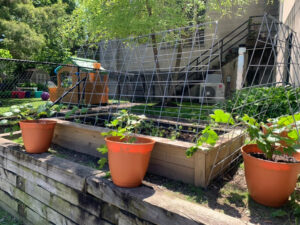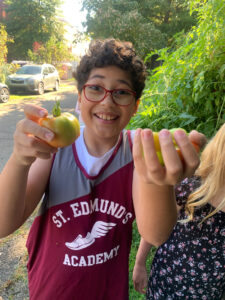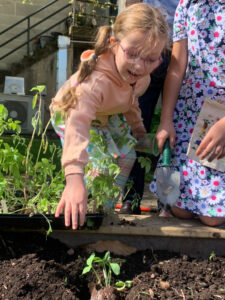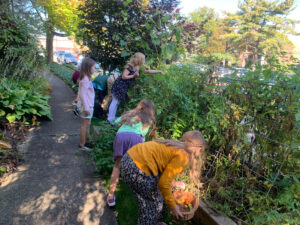 These last few days of February and early days of March have been either a warm sunny prom-ise or a chilly blast with snowflakes flying. What to expect, it’s Pittsburgh! Punxsutawney Phil predicted an late spring, but groundhogs have been known to be mistaken after being yanked early in the morning from a cozy warm den. We can only have faith that spring is on its way!
These last few days of February and early days of March have been either a warm sunny prom-ise or a chilly blast with snowflakes flying. What to expect, it’s Pittsburgh! Punxsutawney Phil predicted an late spring, but groundhogs have been known to be mistaken after being yanked early in the morning from a cozy warm den. We can only have faith that spring is on its way!
 Once again, the diocesan Social Justice and Outreach Committee (SJO) encourages each par-ish to consider creating or sustaining a church vegetable garden. Gardening is is a wonderful outdoor activity offering easy socialization, great fresh air, and much-needed fresh produce for local food pantries and neighbors. So grab those seed catalogs from your mailboxes, and start planning your planting strategy. Once again in 2025, the SJO Committee will offer grants to fund church garden initiatives. For the last ten years, the diocesan SJO Committee has offered a few (4-8) small grants each year to support the efforts of creating and sustaining parish-based vegetable gardens. In 2024, five established gardens received funding: St. Brendan’s (Franklin Park), Holy Cross (Homewood), St. David’s (Peters Township), Shepherd’s Wellness (Bloomfield), and All Saints (Brighton Heights).
Once again, the diocesan Social Justice and Outreach Committee (SJO) encourages each par-ish to consider creating or sustaining a church vegetable garden. Gardening is is a wonderful outdoor activity offering easy socialization, great fresh air, and much-needed fresh produce for local food pantries and neighbors. So grab those seed catalogs from your mailboxes, and start planning your planting strategy. Once again in 2025, the SJO Committee will offer grants to fund church garden initiatives. For the last ten years, the diocesan SJO Committee has offered a few (4-8) small grants each year to support the efforts of creating and sustaining parish-based vegetable gardens. In 2024, five established gardens received funding: St. Brendan’s (Franklin Park), Holy Cross (Homewood), St. David’s (Peters Township), Shepherd’s Wellness (Bloomfield), and All Saints (Brighton Heights).
While the SJO budget is very small, in past years, the SJO is able to fund these garden grants, in part through donations from the Outreach Commission and Claudia Circle of St. Paul’s (Mount Lebanon), ECW, Women of Calvary (East Liberty), and private individuals. If any parish or individual desires to donate to this effort should contact Rebecca Steiner, treasurer, in the diocesan office at rsteiner@episcopalpgh.org, or Marianne Novy, chair of SJO, at mnovy@pitt.edu.
Applying for a garden grant: These grants are intended to support Episcopal parishes and organizations in the Diocese of Pittsburgh to create new vegetable gardens or to support already functioning gardens with small material needs such as: seed or plant purchases, fencing, bed construction, soil or fertilizer purchases, soil testing costs, hand tool purchases, water connections, rain barrels, etc. Depending on the location and circumstance, we expect that produce grown will be distributed through local food pantries or organization-based outreach efforts. In past years, some gardens have played a significant role in youth education. These grants are not intended to support an exclusive or private garden, nor a garden designed solely for decorative purposes. We have prepared a guide to setting up a small garden; this guide is available by contacting Pat Eagon at pkeagon@gmail.com. Should your garden be selected, implementation will be in mid-May, 2025.
The maximum grant request for this program should be no more than $500. Funds are to be used in the calendar year 2024 unless an extension is submitted and approved by the SJO committee. Priority will be given to those applications that seek to start new gardens, but the committee will also consider applications seeking to sustain existing gardens that meet the eligibility described in the application. The application form is available in PDF or Word and are due via USPS, postmarked by April 1, 2025, or electronically (preferable) by April 7, 2025. Submission details are on the application. Any questions regarding eligibility can be directed to Marianne Novy, chair of SJO at mnovy@pitt.edu) or Pat Eagon, garden grant coordinator at pkeagon@gmail.com.
–Photos courtesy Vicki Rispoli, Director of Christian Formation at Calvary, East Liberty


